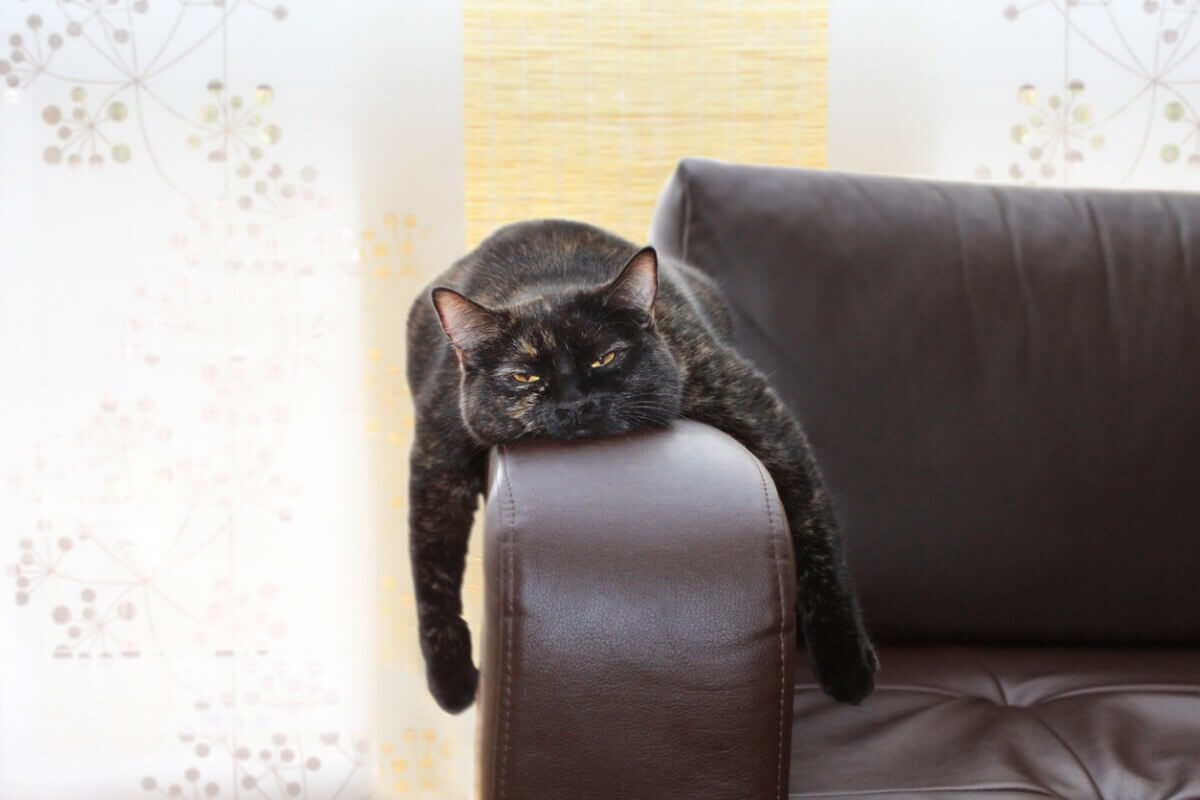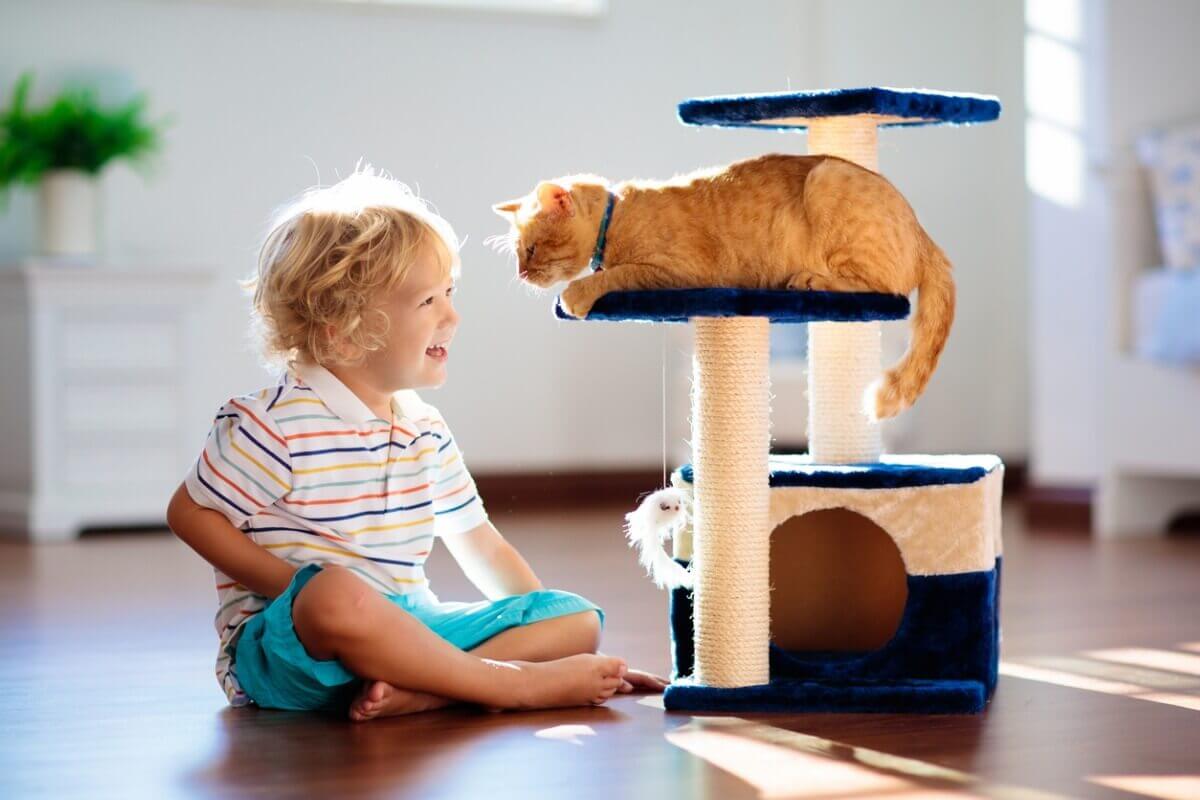Why Your Cat Doesn't Play


Reviewed and approved by the biologist Samuel Sanchez
Despite having some great toys, it may happen that your cat doesn’t play. Why? Play and physical activity are very important in the life of every feline, but sometimes these animals lose interest or don’t feel well enough to carry out certain tasks.
The lack of willingness to play usually implies a health problem in the kitty that needs to be treated or, otherwise, that your cat doesn’t like to play with you or with their toys for some reason. Here are some possible answers to the question of why your cat doesn’t play.
Reasons why your cat doesn’t play
First of all, cats sleep a lot. According to experts, adult felines rest an average of 12 to 15 hours a day spread over several naps, that is, they sleep 75% of the time. Kittens sleep much more: About 20 hours or 90% of the day. However, from 3 or 4 weeks of age, they reduce their amount of sleep to 60%.
Knowing this, you can understand that it’s quite normal if you see your feline sleeping fully for a large part of the day. However, you should be concerned if your cat ultimately doesn’t show even the slightest hint of wanting to play with you or interact with the world around it despite your efforts.
In addition to this, it’s important to know that as kittens grow into adults, they become less restless and playful. However, it’s never too late to physically activate them through play.
Besides all that, your feline companion may not always be playing and jumping around as much as you’d like (or as much as it should). Here are a few reasons that may explain why your cat doesn’t play.

Not feeling well
If you were sick or unwell would you be in the mood to play? The answer is sure to be no, and the same is true for your kitty. A lack of interest in playing (in an extreme form) usually hides some condition or pain that prevents your pet from playing, according to professionals. Therefore, the best thing to do is to consult a veterinarian in order to evaluate your pet.
In addition, little or no interest in play usually also implies that your cat is stressed or anxious about some new or strange situation that makes it uncomfortable. This condition should be treated with the help of a feline educator.
Your cat’s bored with its toys
Cats have preferences when it comes to choosing who or what to play with. Your can may not be interested in certain activities or toys you give it, and this is totally normal and a possibility you need to take into consideration
However, you can try some different toys and activities if your pet isn’t stimulated by business as usual. There are many games you can make yourself with very simple materials, as cats aren’t picky in that regard. They won’t ask for the most expensive toy because even a cardboard box is enough for them.
Exchanging your cat’s toys every week is usually a good option to help it appreciate them all. Put some away while leaving others out.
In addition, it’s important that the feline also interacts with you. You can do this by moving your cat’s toys around or playing hide-and-seek with your pet. Take the time to find out what kind of play your cat enjoys and, of course, rule out any health or behavioral problems that may be at the root of the listless behavior.
Ways to Encourage Play in Your Cat
Most kitties love to lie on laps or lie in the sun, but environmental enrichment and play are part of good overall feline health. If you want your cat to be more active, here are some ways to create an interesting and engaging play routine for your pet:
- Spend more time interacting with your cat every day. While toys can be great enrichment, there’s no better way to encourage activity than having you be part of the fun.
- Create or buy agility games and fill them with treats. This way, your feline will have a fun time and enjoy a good treat, too.
- Get rid of old, ignored toys and create or get a collection of new ones that you think your cat will enjoy.
- Cats, as part of their behavioral drive, need to climb. That’s why it’s highly recommended that your home have feline environmental enrichment. A vertical space (such as a scratching post or gym) will be great for your kitty. Make sure there’s enough height for it to climb a bit.
- You may want to add another feline to your home to encourage your lonely kitty. Just remember that this isn’t a quick fix. Any new pet will need to go through an adjustment process and be in its own room for the first few weeks to allow for a slow and safe introduction.

Now that you know some reasons why your cat doesn’t play and several options for encouraging it to do so, it’s time to apply them. Always remember that play is an indispensable element if you want to make your feline happy, so don’t let their apathy pass you by.
Despite having some great toys, it may happen that your cat doesn’t play. Why? Play and physical activity are very important in the life of every feline, but sometimes these animals lose interest or don’t feel well enough to carry out certain tasks.
The lack of willingness to play usually implies a health problem in the kitty that needs to be treated or, otherwise, that your cat doesn’t like to play with you or with their toys for some reason. Here are some possible answers to the question of why your cat doesn’t play.
Reasons why your cat doesn’t play
First of all, cats sleep a lot. According to experts, adult felines rest an average of 12 to 15 hours a day spread over several naps, that is, they sleep 75% of the time. Kittens sleep much more: About 20 hours or 90% of the day. However, from 3 or 4 weeks of age, they reduce their amount of sleep to 60%.
Knowing this, you can understand that it’s quite normal if you see your feline sleeping fully for a large part of the day. However, you should be concerned if your cat ultimately doesn’t show even the slightest hint of wanting to play with you or interact with the world around it despite your efforts.
In addition to this, it’s important to know that as kittens grow into adults, they become less restless and playful. However, it’s never too late to physically activate them through play.
Besides all that, your feline companion may not always be playing and jumping around as much as you’d like (or as much as it should). Here are a few reasons that may explain why your cat doesn’t play.

Not feeling well
If you were sick or unwell would you be in the mood to play? The answer is sure to be no, and the same is true for your kitty. A lack of interest in playing (in an extreme form) usually hides some condition or pain that prevents your pet from playing, according to professionals. Therefore, the best thing to do is to consult a veterinarian in order to evaluate your pet.
In addition, little or no interest in play usually also implies that your cat is stressed or anxious about some new or strange situation that makes it uncomfortable. This condition should be treated with the help of a feline educator.
Your cat’s bored with its toys
Cats have preferences when it comes to choosing who or what to play with. Your can may not be interested in certain activities or toys you give it, and this is totally normal and a possibility you need to take into consideration
However, you can try some different toys and activities if your pet isn’t stimulated by business as usual. There are many games you can make yourself with very simple materials, as cats aren’t picky in that regard. They won’t ask for the most expensive toy because even a cardboard box is enough for them.
Exchanging your cat’s toys every week is usually a good option to help it appreciate them all. Put some away while leaving others out.
In addition, it’s important that the feline also interacts with you. You can do this by moving your cat’s toys around or playing hide-and-seek with your pet. Take the time to find out what kind of play your cat enjoys and, of course, rule out any health or behavioral problems that may be at the root of the listless behavior.
Ways to Encourage Play in Your Cat
Most kitties love to lie on laps or lie in the sun, but environmental enrichment and play are part of good overall feline health. If you want your cat to be more active, here are some ways to create an interesting and engaging play routine for your pet:
- Spend more time interacting with your cat every day. While toys can be great enrichment, there’s no better way to encourage activity than having you be part of the fun.
- Create or buy agility games and fill them with treats. This way, your feline will have a fun time and enjoy a good treat, too.
- Get rid of old, ignored toys and create or get a collection of new ones that you think your cat will enjoy.
- Cats, as part of their behavioral drive, need to climb. That’s why it’s highly recommended that your home have feline environmental enrichment. A vertical space (such as a scratching post or gym) will be great for your kitty. Make sure there’s enough height for it to climb a bit.
- You may want to add another feline to your home to encourage your lonely kitty. Just remember that this isn’t a quick fix. Any new pet will need to go through an adjustment process and be in its own room for the first few weeks to allow for a slow and safe introduction.

Now that you know some reasons why your cat doesn’t play and several options for encouraging it to do so, it’s time to apply them. Always remember that play is an indispensable element if you want to make your feline happy, so don’t let their apathy pass you by.
All cited sources were thoroughly reviewed by our team to ensure their quality, reliability, currency, and validity. The bibliography of this article was considered reliable and of academic or scientific accuracy.
Peluditos en apuros. (2017, 10 julio). ¿CUÁNTO DUERMEN LOS GATOS? Peluditos en apuros. https://peluditosenapuros.org/blog/2017/07/10/cuanto-duermen-los-gatos/
Staff, O. (2019, 24 junio). When Your Cat Doesn’t Like to Play. Oakland Veterinary Referral Services. https://www.ovrs.com/blog/cat-doesnt-like-to-play/#:%7E:text=If%20there%20is%20no%20interest,stressed%2C%20or%20be%20in%20pain.&text=Cats%20have%20preferences%2C%20just%20like,few%20new%20toys%20and%20activities
This text is provided for informational purposes only and does not replace consultation with a professional. If in doubt, consult your specialist.








